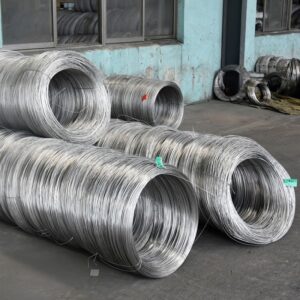BS EN 10270-1 Patented Cold Drawn Unalloyed Spring Steel Wire
patented cold drawn wire
wire drawn to size by cold deformation of a starting material that has been subjected to a thermal treatment of patenting
Spring wire grades
The grade of spring wire used depends on the stress level and the nature of the duty. Where springs are subjected to static stresses or infrequent dynamic loading, a wire grade for static duty (S) shall be used. In the other cases with frequent or predominantly dynamic loading and where small coiling ratios or severe bending radius is required, a wire grade for dynamic duty (D) shall be used. Depending on the stress level, spring wire is manufactured in three tensile strength grades: low, medium and high.
Chemical composition
| Grade | C | Si | Mn | P max. | S max. | Cu max. |
| SL, SM, SH | 0,35-1,00 | 0,10-0,30
|
0,50-1,20
|
0,035 | 0,035 | 0,20 |
| DM, DH | 0,45-1,00 | 0,10-0,30 | 0,50-1,20 | 0,020 | 0,025 | 0,12 |
Form of delivery
The wire shall be delivered in unit packages of a coil, individualized or on carriers, or a spool or spoolless core or as straight lengths. Unless otherwise agreed at the time of ordering, the form of delivery will be coils; straight lengths shall be supplied in bundles.
Coating and surface finish
The spring wire may be supplied phosphate coated (ph) either dry drawn or wet drawn, copper coated (Cu), zinc (Z) or zinc/aluminium (ZA) coated.
Other coatings, considered as special, can be agreed between the purchaser and the supplier.
If no specific surface finish is specified, the type of finish shall be at the manufacturers discretion. In addition, the wire can be ordered with an oiled surface for all surface finishes.
The wire of a unit package shall consist of one single length of wire originating from only one heat. For grades DM and DH only the welds prior to the last patenting operation are allowed; all other welds shall be removed, or, if so agreed upon, properly marked.
For the wire grades SL/SM/SH welds are allowed at the size of the last patenting treatment. For other welds, the treatment of the welds shall be subject to an arrangement between the parties involved, depending on wire diameter and application.
Surface quality
The surface of the wire shall be smooth and as free as possible from grooves, tears, rust and other surface defects which have a noticeable adverse effect on the application of the wire.
Marking and packaging
Each unit shall be properly marked and identified so as to permit traceability and reference to the inspection documents.
The labels shall withstand normal handling and contact with oil; they shall show the information according to Table 9. Other information shall be the subject of an arrangement between the parties.
Wire shipments shall be suitably protected against mechanical damage and/or contamination during transport.
Test inspection
Chemical composition
Tensile test
Surface defects
Decarburization
Zinc and zinc/aluminium coating
Adherence of coating
Coiling test
Torsion test
Wrapping test
Bend test

